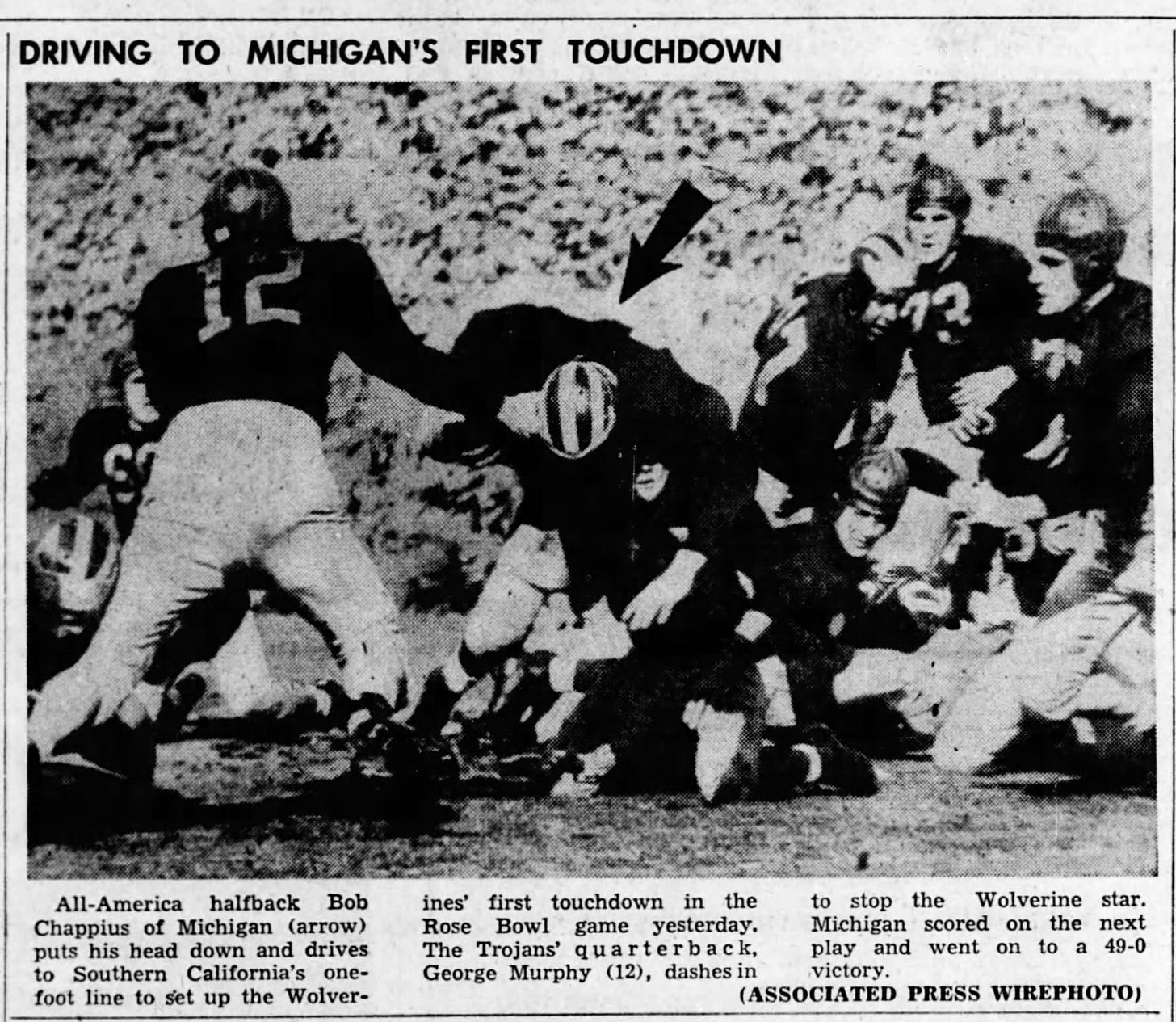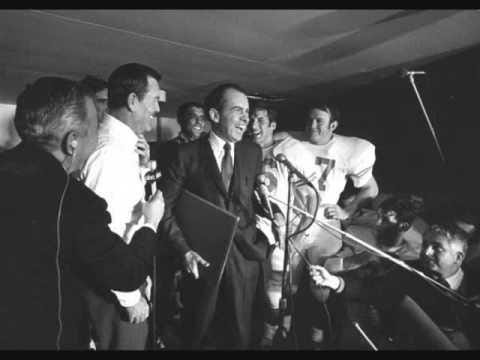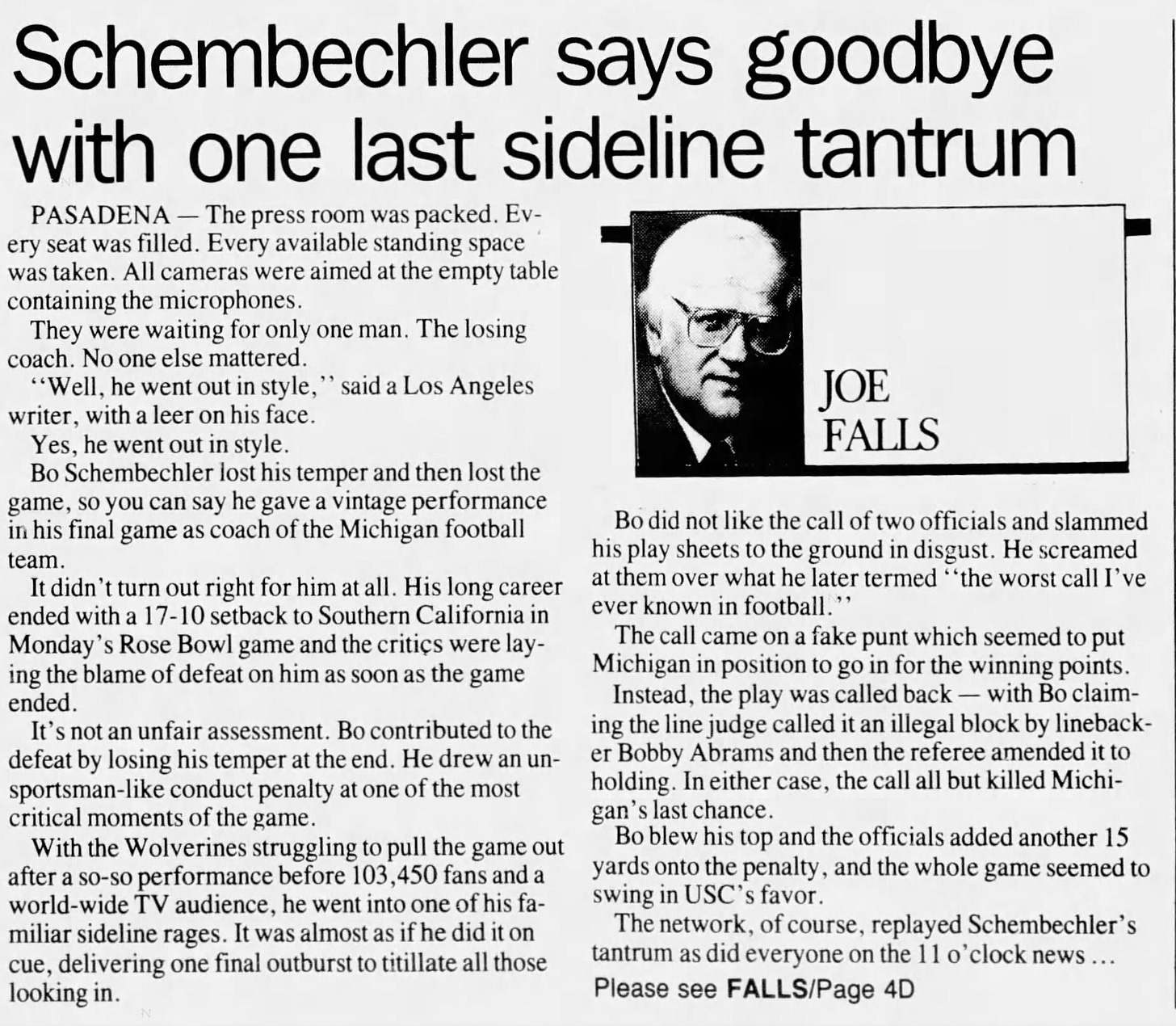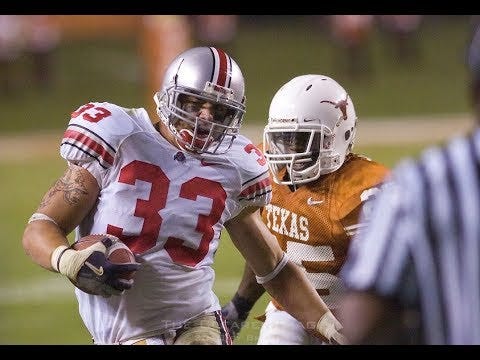Top 10 Tuesday: Every USC-Michigan College Football Game Before 2024
USC's landmark visit to Michigan in Week 4 of the 2024 college football season is just the 11th meeting all-time and third on a campus site between the programs.
USC vs. Michigan was precisely the sort of matchup that promised college football fans a compelling reason for the carving up of regional conferences. Will restructuring the sport to resemble the NFL pay off?
It’s impossible to say either way yet. However, as an ardent naysayer of this new landscape, I can admit there’s a fun novelty to USC visiting the Big House.
Despite both USC and Michigan being powerhouse programs for more than a century, there have been only 10 prior matchups between the two. They last met almost two decades ago in the 2007 Rose Bowl Game, and Saturday’s game is the first played on either school’s campus since 1958.
This edition of Top 10 Tuesday looks at every USC-Michigan encounter since the first in 1948.
Michigan 49, USC 0 — Jan. 1, 1948 (Rose Bowl Game)
USC played a minor role in Michigan’s story during the 1947 season. As society returned to normalcy after World War II, Army’s dominance of college football ended. Michigan reemerged as one of the powers to fill the vacancy, rolling to the first of two straight national championships and the program’s first since 1933.
A reported 93,000 packed into Rose Bowl Stadium as the Wolverines “turned back the calendar to 1902,” as the Associated Press report described, “when a ‘point-a-minute’ Ann Arbor team launched the first Tournament of Roses football game…It was the same score registered in that first historic engagement.”
The 49-point blowout was the worst loss in USC history, and Michigan’s 491 yards of offense set a Rose Bowl record. Jack Weisenburger scored on three touchdown carries, and three different Wolverines threw for touchdowns: Bob Chappius, Hank Fonde, and Howard Yerges.
Michigan 16, USC 6 — Sept. 28, 1957
In a display that made the behind-the-scenes machinations working against Rich Rodriguez at Michigan look downright congenial in comparison, legendary Wolverines’ retired coach Fritz Crisler blasted the 1957 team in a press event ahead of a visit to Los Angeles Memorial Coliseum.
“If it’s any consolation to [USC coach] Don Clark, our Rinkydinks kicked the daylights out of the first string last week in practice,” UP wire reports quoted Crisler as saying. Crisler did offer some complimentary words about Bennie Osterbaan’s running back rotation, calling the group “more than serviceable.”
Indeed, it was Michigan’s running backs who carried the Wolverines to a 16-6 win, out-gaining USC 191-119 on the ground. Jim Pace scored a rushing touchdown, and Brad Myers added another on a Statue of Liberty play.
While beating USC in Los Angeles may seem like a positive start for Osterbaan to defy his predecessor’s low expectations, the 1957 Trojans finished a dismal 1-9. The roles were reversed a year later when USC came to the Big House for the first, and before 2024, only time.
Michigan 20, USC 19 — Sept. 27, 1958
USC opened what became a middling 1958 season with an emphatic win over 12th-ranked Oregon State, 21-0. The Trojans traveled to Ann Arbor the next week for a matchup that, given each historically excellent program’s downturns, was more noteworthy for the halftime show featuring 12,000 high school band members performing together.
The immediate aftermath of a 20-19 Michigan win sparked some optimism, if only momentarily. Lad Slingerlend of the Lansing State Journal wrote: “Coach Bennie Oosterbaan’s blue-shirted warriors looked like Wolverine teams of championship days in three scoring drives.” Before opening himself up to a 1950s version of that awful Old Takes Exposed account, Slingerlend added, “The offense sputtered the rest of the time and defensive lapses let the fighting Trojans stay in the game right up to the final gun.”
USC scored two touchdowns in the final five minutes to erase a seemingly safe Michigan lead. Penalties on the Trojans’ extra-point attempts denied them two critical points, and the Wolverines won. It was one of only two victories for Michigan on the season, leading to an offseason coaching change. Bump Elliott took over, but he’d never coach against USC.
The next meeting between the programs came with another new hire at the helm.
USC 10, Michigan 3 — Jan. 1, 1970 (Rose Bowl Game)
The tumultuous 1969 season included the beginning of Bo Schembechler and Woody Hayes’ “10-Year War” for Big Ten Conference supremacy. Michigan beat No. 1-ranked Ohio State, 24-12, denying the Buckeyes a claim to the national championship. Ohio State could not play in the Rose Bowl win or lose because the Granddaddy of ‘Em All had a rule preventing repeat competitors; but the Buckeyes went without any bowl appearance to close the ’69 campaign.
The Greatest Days in College Football History: Richard Nixon Becomes The Gridiron Star He Always Wanted to Be
I was the only out-front, openly hostile Peace Freak; the only one wearing old Levis and a ski jacket, the only one (no, there was one other) who’d smoked grass on Nixon’s big Greyhound press bus, and certainly the only one who habitually referred to the candidate as “the Dingbat.”
USC had recovered from its late 1950s swoon by the early ‘60s, winning national championships in 1962 and 1967. A tie against rival Notre Dame and the political maneuverings of Richard Nixon complicated the Trojans’ hope of a third title to close out the decade, but they could open the ‘70s on the right foot with their first win ever against Michigan.
That historic win came courtesy of Jimmy Jones’ 33-yard touchdown pass to Bob Chandler in the third quarter, breaking a 3-3 tie and beginning the road to a 3-3 tie in the USC-Michigan series.
USC 14, Michigan 6 — Jan. 1, 1977 (Rose Bowl Game)
For the first time in their 30 years of facing off intermittently, Michigan and USC squared off in the Rose Bowl with both harboring realistic national championship ambitions. This showdown between No. 2 and No. 3 in the AP Top 25 lived up to the stakes, too, coming down to the fourth quarter.
USC, which earned its way into the Rose Bowl by beating another second-ranked team in UCLA to close the regular season, gave itself breathing room with a Charles White touchdown in the fourth quarter.
The freshman White’s heroics set the stage for his eventual run to the Heisman Trophy in 1979. That calendar year opened with another big performance from White in the Granddaddy.
USC 17, Michigan 10 — Jan. 1, 1979 (Rose Bowl Game)
A “Phantom Touchdown” and an earthquake defined the 1979 Rose Bowl as one of the most notorious entries in the game’s illustrious history.
The UPI report describes “a controversial play that NBC kept showing over and over,” where “Charles White scored on a 3-yard dive. Or at least, the officials ruled he scored.
“But the millions viewing on national TV probably disagreed. The television replays showed that White went into the end zone, but he didn’t have the ball when he got there because he fumbled before he got there. Of course, camera angles can sometimes be deceiving.”
White told reporters after the 17-10 Trojans win that his second-quarter touchdown, which effectively made the difference, “was a good call.”
“I saw the official signal touchdown and I released the ball,” he said. Adding that he agreed with the referees’ decision, White said, “What do you think I’m going to say?”
Michigan 22, USC 14 — Jan. 2, 1989 (Rose Bowl Game)
Michigan had to wait a decade for an opportunity at payback for the controversial 1979 Rose Bowl. The Wolverines also needed a couple of extra quarters to make it happen, trailing the Trojans 14-3 at halftime.
Big Ten physicality took over in the second half, however, during which Michigan limited USC to 31 yards on the ground. Rendering the Trojans’ offense one-dimensional allowed the Wolverines to pound their way to 19 second-half points. Bo Schembechler also told reporters he instructed his team “to expect the unexpected,” which included calling for more passes than USC’s Rodney Peete actually threw.
Schembechler went into the 1988 campaign having had triple-bypass surgery, which contributed to his retirement a year later.
USC 17, Michigan 10 — Jan. 1, 1990 (Rose Bowl Game)
Schembechler returned to the Rose Bowl Game one final time and coaching opposite USC for the fifth time. His coaching career ended on a low note — which became a much lower note decades later1 — as Schembechler garnered an unsportsmanlike conduct penalty late in the game that helped set up the Trojans’ game-winning touchdown.
Schembechler then refused to do postgame interviews, leaving the below final impression after 20 years that spanning from 1969 to New Year’s Day 1990, crossed four decades.
USC 28, Michigan 14 — Jan. 1, 2004 (Rose Bowl Game)
Beginning with their first meeting in 1948 and before the current one, the longest stretch between Michigan and USC matchups was the 14 years from the 1990 to the 2004 Rose Bowls.
Michigan rebounded from losses at Oregon and Iowa in the first half of the season to win six straight — including a 35-21 defeat of reigning national champion and No. 4-ranked Ohio State. The Wolverines’ win in The Game was their last until 2011.
USC, meanwhile, came into the 2004 Rose Bowl just getting started on one of the most impressive winning streaks of the modern era. After losing a thriller to Cal in one of the best Pac-12 games ever played, the Trojans steamrolled their next eight opponents by no fewer than 20 points.
Pac-12 Tuesday: The Golden Bear Effect - How A Cal Win Over USC Changed Everything
The 108th and hopefully-not-final season of Pac-12 Conference football kicks off this Saturday when USC hosts San Jose State. In recognition of the league’s illustrious lineage and in preparation for an uncertain future, I am dedicating this space each Tuesday throughout the football and basketball seasons to a memorable moment from its history.
Their dominance elevated the Trojans to No. 2 in the AP Top 25, and another double-digit-point romp in the Rose Bowl pushed USC to No. 1. In some ways, this game marked the last hurrah of the classic college football season. While the Bowl Championship Series was in its sixth year, Oklahoma playing LSU in the Sugar Bowl despite losing the Big 12 Championship Game put the national title in some doubt.
The Sooners and Tigers going to the wire in a snoozer of a BCS Championship led to the last-ever truly split national championship. It’s the last time a Big Ten vs. Pac-12 matchup in the Granddaddy of ‘Em All impacted the title.
That it was USC and Michigan is fitting.
USC 32, Michigan 18 — Jan. 1, 2007 (Rose Bowl Game)
Both Michigan and USC came into the 93rd Rose Bowl off of deflating finishes to the regular season. On the same week as Bo Schembechler’s death, the Wolverines lost to Ohio State in a Game of the Century that lived up to its billing.
The Rarity of No. 1 vs. No. 2
Just four regular-season matchups between No. 1 and No. 2-ranked teams have gone down in the FBS during the 21st Century:
Michigan’s 42-39 defeat opened the door for USC to return to its third straight BCS Championship Game; the Trojans only needed to defeat a middling UCLA on the first week of December.
Instead, the Bruins won a 13-9 rock fight that I argue provided the opening salvo leading to today’s college football landscape. USC falling out of the BCS Championship Game opened the door for Florida, which trounced Ohio State to claim the first of seven consecutive national titles for the SEC.
Florida winning, and doing so as emphatically as it did, fueled the media blitz pushing SEC supremacy — which, in turn, played a contributing role in keeping USC out of the 2008 BCS Championship Game. I see that 2008 season as pivotal in deteriorating the relationship between USC and the Pac-12, and the SEC’s overwhelming presence in this era as creating the arms race that gives us Michigan and USC as conference opponents.
Discussing Schembechler’s position at Michigan without addressing the llegations of him covering up sexual abuse during his tenure is difficult.








